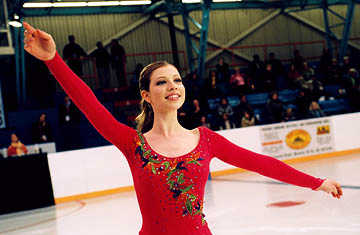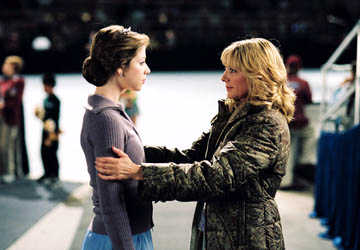

If a parent had a choice to either send their daughter to Harvard, or have them potentially compete in professional figure skating, is there really any argument as to which choice is logical? Ice Princess begs to differ. In fact, the movie refuses to acknowledge that there are probably a myriad of choices where one can do both, but that is really beside the point. Ice Princess is one of those wish fulfillment movies for young women, barely steeped in reality. The movie is meant to be a modern fairy tale, but it makes a few too many logical missteps to work. The best asset is has going for it is Michelle Trachtenberg, who displays a great sense of awkward vulnerability, which inevitably changes to confidence over the course of the film.
Overall, it's a fairly nice movie, but apply any sort of brainpower to it and it falls apart. Part of this is because it takes place in the 'real' world, unlike some other ones where girls become princesses and such. Trachtenberg (Eurotrip, Can't Be Heaven) is Casey Carlyle, school physics geek and Harvard aspirant. Her physics professor wants her to come up with a science project that she has an emotional connection to in order to help her application to Harvard. She decides to apply physics to ice-skating. Along the way, she helps improve the skills of Gen Harwood (Hayden Panettierre, Racing Stripes, Raising Helen) and some other stock characters. Casey then tries her own techniques, and discovers that she has a lot of 'raw talent.' She wants to try ice skating, against the wishes of her stern academic mother Joan (Joan Cusack, The Last Shot, Raising Helen), Harwood's dictatorial mother Tina (Kim Cattral, Crossroads, 15 Minutes), and Gen and her friends.
This is one of those movies where there are no real 'bad guys,' except for the expectations of parents. In this sense, Ice Princess does something a bit new. Everybody wants what they think is the best for Casey, forgetting to ask her what she really wants. Gen initially antagonizes Casey before becoming a good friend. Joan and Tina both see specific aspects of Casey; the ones they identify with. It's too bad that Meg Cabot (The Princess Diaries) and Hadley Davis' screenplay reduces Joan to somebody who doesn't like figure skating because of some vague feminist reasons (revolving around how ugly the clothes are). Casey resents the cutthroat tactics of Tina, and resents Joan's attempts to impose her dreams upon her daughter.
The best way to enjoy Ice Princess is on a very superficial level. Director Tim Fywell (who directed the much more enchanting I Capture the Castle) paces things efficiently. There are the typical obstacles, the hunky guy (Trevor Blumas), and of course, the big competition. But look any closer, and the story falls apart. Sure, somebody may have talent, but to go from recreational figure skater to contender in a matter of months is ridiculous. Trachtenberg did a lot of her own skating, but many of the more complicated moves used body doubles. Fywell did cast figure skaters in some of the supporting roles, which does lend an air of believability (however thing) to the film. Above all, it is the Harvard or skating conflict that makes an otherwise harmless film a bit laughable.